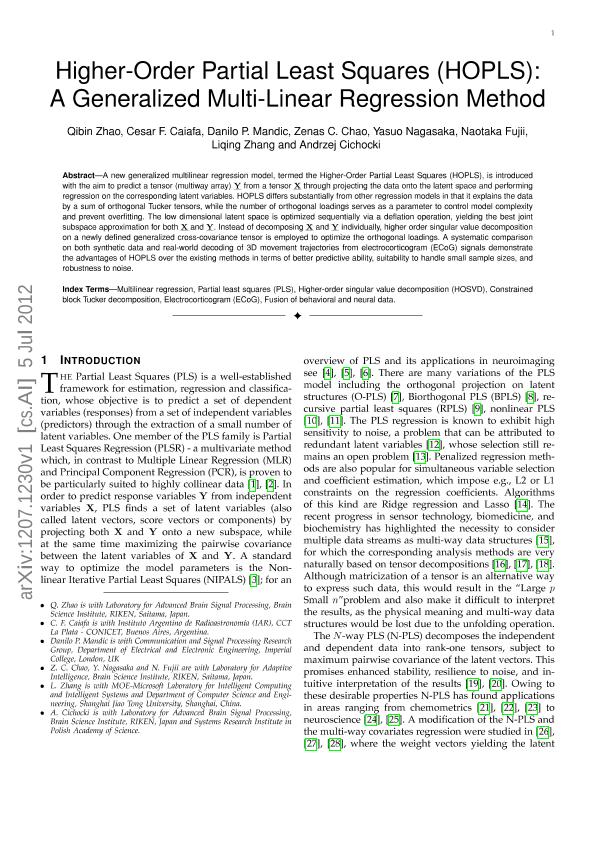Mostrar el registro sencillo del ítem
dc.contributor.author
Zhao, Qibin
dc.contributor.author
Caiafa, Cesar Federico

dc.contributor.author
Mandic, Danilo P.
dc.contributor.author
Chao, Zenas C.
dc.contributor.author
Nagasaka, Yasuo
dc.contributor.author
Fujii, Naotaka
dc.contributor.author
Zhang, Liqing
dc.contributor.author
Cichocki, Andrzej
dc.date.available
2016-03-04T19:14:21Z
dc.date.issued
2013-07
dc.identifier.citation
Zhao, Qibin ; Caiafa, Cesar Federico; Mandic, Danilo P. ; Chao, Zenas C. ; Nagasaka, Yasuo ; et al.; Higher-Order Partial Least Squares (HOPLS) : a generalized multi-linear regression method; IEEE Computer Society; IEEE Transactions on Pattern Analysis and Machine Intelligence; 35; 7; 7-2013; 1660-1673
dc.identifier.issn
0162-8828
dc.identifier.uri
http://hdl.handle.net/11336/4630
dc.description.abstract
A new generalized multilinear regression model, termed the Higher-Order Partial Least Squares (HOPLS), is introduced with the aim to predict a tensor (multiway array) Y from a tensor X through projecting the data onto the latent space and performing regression on the corresponding latent variables. HOPLS differs substantially from other regression models in that it explains the data by a sum of orthogonal Tucker tensors, while the number of orthogonal loadings serves as a parameter to control model complexity and prevent overfitting. The low dimensional latent space is optimized sequentially via a deflation operation, yielding the best joint subspace approximation for both X and Y. Instead of decomposing X and Y individually, higher order singular value decomposition on a newly defined generalized cross-covariance tensor is employed to optimize the orthogonal loadings. A systematic comparison on both synthetic data and real-world decoding of 3D movement trajectories from electrocorticogram (ECoG) signals demonstrate the advantages of HOPLS over the existing methods in terms of better predictive ability, suitability to handle small sample sizes, and robustness to noise.
dc.format
application/pdf
dc.language.iso
eng
dc.publisher
IEEE Computer Society
dc.rights
info:eu-repo/semantics/openAccess
dc.rights.uri
https://creativecommons.org/licenses/by-nc-sa/2.5/ar/
dc.subject
Multilinear Regression
dc.subject
Partial Least Squares
dc.subject
Higher-Order Singular Value Decompostion
dc.subject
Constrained Block Tucker Decomposition
dc.subject.classification
Ingeniería Eléctrica y Electrónica

dc.subject.classification
Ingeniería Eléctrica, Ingeniería Electrónica e Ingeniería de la Información

dc.subject.classification
INGENIERÍAS Y TECNOLOGÍAS

dc.title
Higher-Order Partial Least Squares (HOPLS) : a generalized multi-linear regression method
dc.type
info:eu-repo/semantics/article
dc.type
info:ar-repo/semantics/artículo
dc.type
info:eu-repo/semantics/publishedVersion
dc.date.updated
2016-03-30 10:35:44.97925-03
dc.journal.volume
35
dc.journal.number
7
dc.journal.pagination
1660-1673
dc.journal.pais
Estados Unidos

dc.journal.ciudad
Los Alamitos
dc.conicet.avisoEditorial
This work has been submitted to the IEEE for possible publication. Copyright may be transferred without notice, after which this version may no longer be accessible
dc.description.fil
Fil: Zhao, Qibin . RIKEN Brain Science Institute; Japón
dc.description.fil
Fil: Caiafa, Cesar Federico. Consejo Nacional de Investigaciones Científicas y Técnicas. Centro Científico Tecnológico La Plata. Instituto Argentino de Radioastronomia (i); Argentina
dc.description.fil
Fil: Mandic, Danilo P. . Imperial College Of Science And Technology; Reino Unido
dc.description.fil
Fil: Chao, Zenas C. . RIKEN Brain Science Institute; Japón
dc.description.fil
Fil: Nagasaka, Yasuo . RIKEN Brain Science Institute; Japón
dc.description.fil
Fil: Fujii, Naotaka. RIKEN Brain Science Institute; Japón
dc.description.fil
Fil: Zhang, Liqing. Shanghai Jiao Tong University; China
dc.description.fil
Fil: Cichocki, Andrzej. RIKEN Brain Science Institute; Japón
dc.journal.title
IEEE Transactions on Pattern Analysis and Machine Intelligence

dc.relation.alternativeid
info:eu-repo/semantics/altIdentifier/doi/http://dx.doi.org/10.1109/TPAMI.2012.254
dc.relation.alternativeid
info:eu-repo/semantics/altIdentifier/arxiv/http://arxiv.org/abs/1207.1230
dc.relation.alternativeid
info:eu-repo/semantics/altIdentifier/url/https://www.computer.org/csdl/trans/tp/2013/07/ttp2013071660-abs.html
Archivos asociados
